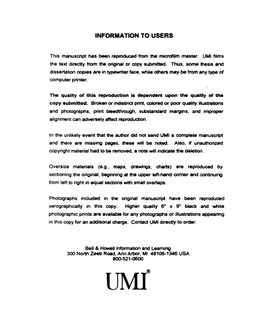| dc.contributor.advisor | Peters, Ron, | en_US |
| dc.contributor.author | Stewart, William G. | en_US |
| dc.date.accessioned | 2013-08-16T12:31:08Z | |
| dc.date.available | 2013-08-16T12:31:08Z | |
| dc.date.issued | 2000 | en_US |
| dc.identifier.uri | https://hdl.handle.net/11244/6027 | |
| dc.description.abstract | The study was based on a series of 48 surveys and interviews of commissioned officers representing all services and commissioned grades conducted at a joint service headquarters organization in Europe. The factor analytical techniques of Q Methodology were used to distill meaning from the subjective judgments of the participants. Subsequent responses to semi-structured questioning helped put the findings in context and triangulated the results with qualitative data. | en_US |
| dc.description.abstract | This study probed U.S. military officers on their perceptions of effective leadership and management behaviors. The question dealt with here was what actual military leaders and managers reported to have been effective for them. It was hypothesized that those behaviors found effective would certainly vary by service branch and relative seniority. Further, it was suggested that a number of variables such as the ethnicity and gender of the leaders, and whether their duties were in operations or support roles amongst other things, would be factors controlling the choice of leadership and management styles. The aim, then, was to build a theory describing those styles that were perceived to lead to organizational success. | en_US |
| dc.description.abstract | Respondents reported that they found both transformational and transactional leadership styles useful. They believed that the application of several different leadership approaches---cognitive frameworks---was necessary to ensure organizational success. In all, four distinctive leadership patterns were discovered. There was a consensus that being inspirational was very important to effective leadership and management in all situations. The efficacy of some techniques associated with power and office politics was nearly equally universally denied. In the end, military officers deemed that the selection and application of their leadership tools must be based on the situation at hand. The groups studied displayed important though sometimes subtle differences in their leader styles. As a whole, however, this sample of officers made their focus on mission accomplishment of paramount importance when balanced against any other concerns. | en_US |
| dc.format.extent | xiii, 184 leaves : | en_US |
| dc.subject | Management. | en_US |
| dc.subject | Armed Forces Officers. | en_US |
| dc.subject | Business Administration, Management. | en_US |
| dc.subject | Leadership United States. | en_US |
| dc.title | Perceptions of leadership and management in the Armed Forces of the United States. | en_US |
| dc.type | Thesis | en_US |
| dc.thesis.degree | Ph.D. | en_US |
| dc.thesis.degreeDiscipline | Department of Political Science | en_US |
| dc.note | Source: Dissertation Abstracts International, Volume: 61-08, Section: A, page: 3257. | en_US |
| dc.note | Director: Ron Peters. | en_US |
| ou.identifier | (UMI)AAI9985576 | en_US |
| ou.group | College of Arts and Sciences::Department of Political Science | |
